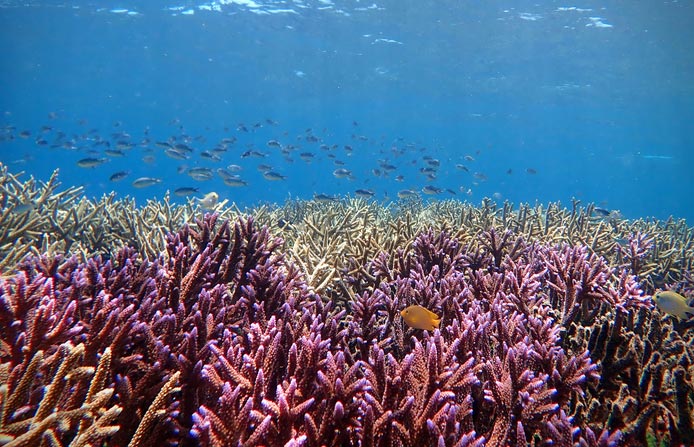AI learns coral reef ‘song’

A healthy coral reef in Sulawesi, Indonesia
Credit: Tim Lamont
Artificial Intelligence (AI) can track the health of coral reefs by learning the “song of the reef”, new research shows.
Coral reefs have a complex soundscape – and even experts have to conduct painstaking analysis to measure reef health based on sound recordings.
In the new study, University of Exeter scientists trained a computer algorithm using multiple recordings of healthy and degraded reefs, allowing the machine to learn the difference.
The computer then analysed a host of new recordings, and successfully identified reef health 92% of the time.
The team used this to track the progress of reef restoration projects.
“Coral reefs are facing multiple threats including climate change, so monitoring their health and the success of conservation projects is vital,” said lead author Ben Williams.
“One major difficulty is that visual and acoustic surveys of reefs usually rely on labour-intensive methods.
“Visual surveys are also limited by the fact that many reef creatures conceal themselves, or are active at night, while the complexity of reef sounds has made it difficult to identify reef health using individual recordings.
“Our approach to that problem was to use machine learning – to see whether a computer could learn the song of the reef.
“Our findings show that a computer can pick up patterns that are undetectable to the human ear. It can tell us faster, and more accurately, how the reef is doing.”
The fish and other creatures living on coral reefs make a vast range of sounds.
The meaning of many of these calls remains unknown, but the new AI method can distinguish between the overall sounds of healthy and unhealthy reefs.
The recordings used in the study were taken at the Mars Coral Reef Restoration Project, which is restoring heavily damaged reefs in Indonesia.
Co-author Dr Tim Lamont, from Lancaster University, said the AI method creates major opportunities to improve coral reef monitoring.
“This is a really exciting development. Sound recorders and AI could be used around the world to monitor the health of reefs, and discover whether attempts to protect and restore them are working,” Dr Lamont said.
“In many cases it’s easier and cheaper to deploy an underwater hydrophone on a reef and leave it there than to have expert divers visiting the reef repeatedly to survey it – especially in remote locations.”
The study was funded by the Natural Environment Research Council and the Swiss National Science Foundation.
The paper, published in the journal Ecological Indicators, is entitled: “Enhancing automated analysis of marine soundscapes using machine learning to combine ecoacoustic indices.”
Journal: Ecological Indicators
DOI: 10.1016/j.ecolind.2022.108986
Method of Research: Data/statistical analysis
Subject of Research: Not applicable
Article Title: Enhancing automated analysis of marine soundscapes using ecoacoustic indices and machine learning
Article Publication Date: 20-May-2022
Media Contact
Louise Vennells
University of Exeter
pressoffice@exeter.ac.uk
Office: 0044-139-272-2062
All latest news from the category: Ecology, The Environment and Conservation
This complex theme deals primarily with interactions between organisms and the environmental factors that impact them, but to a greater extent between individual inanimate environmental factors.
innovations-report offers informative reports and articles on topics such as climate protection, landscape conservation, ecological systems, wildlife and nature parks and ecosystem efficiency and balance.
Newest articles

Innovative 3D printed scaffolds offer new hope for bone healing
Researchers at the Institute for Bioengineering of Catalonia have developed novel 3D printed PLA-CaP scaffolds that promote blood vessel formation, ensuring better healing and regeneration of bone tissue. Bone is…

The surprising role of gut infection in Alzheimer’s disease
ASU- and Banner Alzheimer’s Institute-led study implicates link between a common virus and the disease, which travels from the gut to the brain and may be a target for antiviral…

Molecular gardening: New enzymes discovered for protein modification pruning
How deubiquitinases USP53 and USP54 cleave long polyubiquitin chains and how the former is linked to liver disease in children. Deubiquitinases (DUBs) are enzymes used by cells to trim protein…



